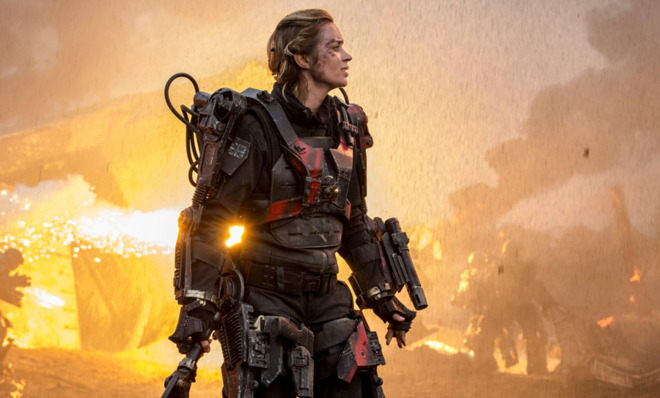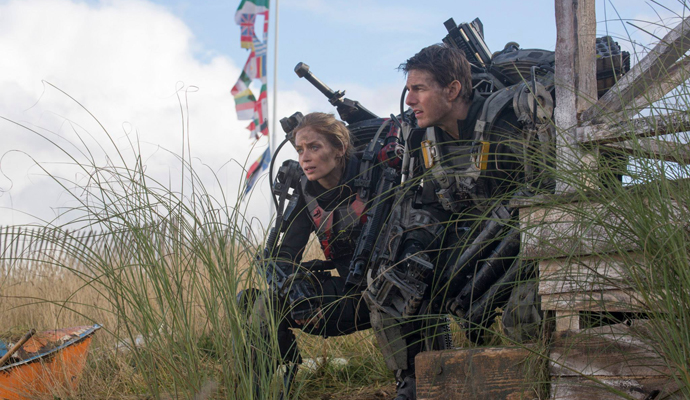Girls on Film: Hollywood keeps stranding women at the Edge of Tomorrow
Badass characters like Edge of Tomorrow's Vrataski seem to push Hollywood forward — but when will a woman be more than a "Female Yoda"?


A free daily email with the biggest news stories of the day – and the best features from TheWeek.com
You are now subscribed
Your newsletter sign-up was successful
Given the number of roles he's had over the course of his career, it's amazing that we have yet to see Tom Cruise sing the Mighty Mouse theme, "Here I Come to Save the Day." For the last 30 years, Cruise has saved the day time and again. He'll run and run toward any danger until he's victorious. It's a formula that turned him into one of Hollywood's most bankable stars.
But in his latest must-see action film, Edge of Tomorrow, things play out a little differently. Here, Cruise is the cowardly man who will save the day only after a powerful woman teaches him how.
Cruise plays Cage, a former adman who becomes a military media consultant after an alien invasion. Despite his inexperience, he is being sent into action whether he likes it or not. Cage is stuffed into a metal ExoSuit that makes Matt Damon's Elysium version look like a dental retainer, and is dropped upon the shores of a battlefield. He dies almost instantly, but ends up caught in a time loop, waking up on the base on the previous day — but armed with his memories of the future. In an endless cycle, he fights, dies, and reboots until Emily Blunt's Rita Vrataski arrives to give his loop purpose.
The Week
Escape your echo chamber. Get the facts behind the news, plus analysis from multiple perspectives.

Sign up for The Week's Free Newsletters
From our morning news briefing to a weekly Good News Newsletter, get the best of The Week delivered directly to your inbox.
From our morning news briefing to a weekly Good News Newsletter, get the best of The Week delivered directly to your inbox.
Vrataski is the tough-as-nails warrior who doubles as the face of the military campaign to stop the aliens. She has excelled in ways no one else has, and Cage learns why: She used to have time loop power, and thus the ability to fight repeatedly until she learned the right moves to succeed.
Unfortunately, she no longer has the power. Instead, she's forced to teach Cruise not only how to use it, but how to be a soldier in the first place.
Edge of Tomorrow is the latest example of "The Chosen One" narrative. By now, the conceit should be familiar. A threat or challenge proves to be unstoppable until a Chosen One arrives to make things right. But before that destiny can be fulfilled, the hero needs to learn how to achieve victory. And it's only with the help of powerful people — usually women — that he succeeds.
This dichotomy fueled the Harry Potter series, The Lego Movie, The Matrix, and more. It lives on in many forms, from smart-girl sidekicks of bumbling heroes (Cloudy With a Chance of Meatballs) to scene-stealers doomed to always be in a supporting role (Scarlett Johansson's Black Widow, most recently seen in Captain America: The Winter Soldier).
A free daily email with the biggest news stories of the day – and the best features from TheWeek.com
It's the Female Yoda Phenomenon: A seasoned warrior who has the knowledge and skill to transform the ineffectual everyman into a heroic savior. She is smart, competent, and tough. At her most mundane, she will teach the hero about responsibility and maturity (Knocked Up). At her most powerful, she will use her countless skills to make the male hero into a fighter like herself (Matrix, Edge of Tomorrow).

The Female Yoda has become the new normal because it allows Hollywood to appeal to feminist concerns while continuing to feed male wish fulfillment. She looks so killer in action — and seems so good on paper — that she seems to shut down arguments about female marginalization. She's better than the hero: Stronger, smarter, more mature.
Unfortunately — since her superiority is a given, and doesn't need to be proven — we never get to see it. In action cinema, we've evolved straight from the leather-clad, busty ass-kickers who offer equal helpings of strength and sex appeal, to heroines who are tasked with passing the torch. There are exceptions, of course — but those are female characters that the filmmaker had to fight for (as in Gravity), and are still the exception rather than the rule.
As a supporting player rather than star, the Female Yoda gets saddled with more than just the male hero's inadequacies. She's also forced to shoulder masculine viewpoints and needs.
Edge of Tomorrow's Vrataski is simultaneously the hero who leads the war effort and the target of sexism. There's a note of jealous condescension that follows her elevated stature in a male-dominated war. She's not just a warrior or soldier; she's the "Angel" of Verdun, or the Full Metal "Bitch." Her fearless success elevates her, but her gender qualifies her power.
Moreover, since she is a woman, she must also be the love interest. For Cruise's Cage, a romantic connection makes sense. She is his partner — the only soldier he can trust with his secret. More importantly, he remembers each day he spends with her. But he isn't the one to make a move. In the context of the story, Vrataski never knows Cage for more than a day — but when the climax arrives, she adds a romantic pulse to the proceedings with a kiss.

For all of the character's power, it can still be undone in an instant, as Hollywood's obsession with romance trumps storytelling sense. It's particularly egregious for Edge of Tomorrow, because Vrataski knows the price of connection: Bonding with the people you fight with, then watching them die over and over and over again.
Throughout the film Vrataski gives us hints of her past — how she fought and perfected herself, and how the loss of friends and loved ones fuels her hardened, solitary power now. Each revelation feels like a nod to a previous film, making Edge of Tomorrow feel less like the fun, original, and exciting standalone action movie of the summer than a great sequel to a film we never got the chance to see.
But that's not the story we get here. Vrataski is tough enough to teach Tom Cruise, fight aliens, and be the most badass warrior in the world. But she's still a woman — the big box office question mark. In this world of endless franchises and origin stories, Vrataski offers some irony — the origin story that could only come after Tom Cruise gets his fight on.
Ultimately, Edge of Tomorrow is not the story of how soldiers fought tirelessly to eradicate an invading alien race, but a story of Hollywood still caught in an endless loop of gendered habit. Studios create female characters, mess them up, and try again.
The question is: How many more tries until the studios figure it out, and cinema moves forward?
Girls on Film is a weekly column focusing on women and cinema. It can be found at TheWeek.com every Friday morning. And be sure to follow the Girls on Film Twitter feed for additional femme-con.
Monika Bartyzel is a freelance writer and creator of Girls on Film, a weekly look at femme-centric film news and concerns, now appearing at TheWeek.com. Her work has been published on sites including The Atlantic, Movies.com, Moviefone, Collider, and the now-defunct Cinematical, where she was a lead writer and assignment editor.
-
 The Olympic timekeepers keeping the Games on track
The Olympic timekeepers keeping the Games on trackUnder the Radar Swiss watchmaking giant Omega has been at the finish line of every Olympic Games for nearly 100 years
-
 Will increasing tensions with Iran boil over into war?
Will increasing tensions with Iran boil over into war?Today’s Big Question President Donald Trump has recently been threatening the country
-
 Corruption: The spy sheikh and the president
Corruption: The spy sheikh and the presidentFeature Trump is at the center of another scandal
